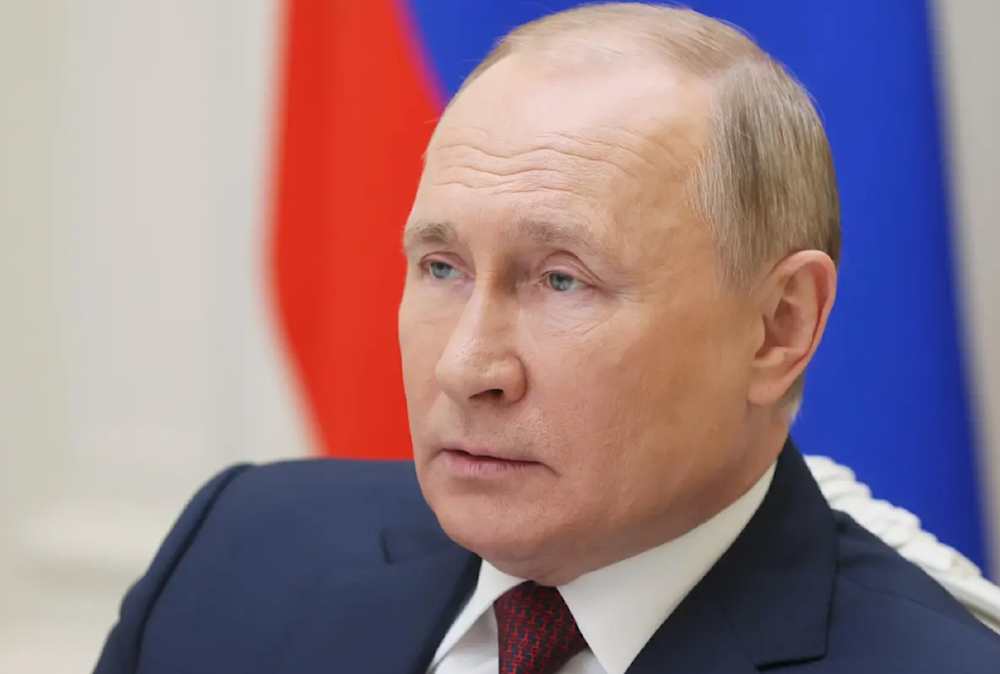NATO discusses direct involvement in Ukraine war: Putin
Putin said that the active engagement of Western nations in the Ukrainian war alters its nature, forcing Russia to make decisions based on the risks produced as a result.
-

Russian President Vladimir Putin attends a video call of the VTB Capital "Russia Calling!" Investment Forum in Moscow, Russia, on November 30, 2021. (AP)
NATO nations are not only debating the possibility of Kiev using Western long-range weaponry but also contemplating whether to intervene actively in the Ukrainian war, Russian President Vladimir Putin stated on Thursday.
According to Putin, "In fact, only servicemen from NATO countries can make flight assignments to these missile systems. Ukrainian servicepeople cannot do that. So this is not a question of allowing the Ukrainian regime to attack Russia with these weapons or not. It is a question of deciding whether NATO countries are directly involved in a military conflict or not."
The Russian President warned that if this is done, it will mean NATO is directly participating in the war, citing that the debates with the United States and the European Union over permitting Ukraine to employ Western precision weapons to strike deep inside Russia have been referred to as a concept replacement.
"If this decision is taken, it will mean nothing else than direct participation of NATO countries - the USA and European countries - in the war in Ukraine," Putin stated.
Ukraine is unable to strike deep into Russian territory without Western assistance, and it needs satellite intelligence and aviation operations to accomplish it, the president stated.
The active engagement of Western nations in the Ukrainian war alters its nature, forcing Russia to make decisions based on the risks produced as a result, Putin continued.
US and British senior diplomats will discuss easing restrictions on Ukraine's use of Western weapons amid its war with Russia during their visit to Kiev that began Wednesday.
The joint trip is composed of US Secretary of State Antony Blinken and UK Foreign Secretary David Lammy, whose newly-appointed government has pledged to be Ukraine's key defender.
The visit coincides with Ukrainian President Volodymyr Zelensky's pressure on his Western allies to provide more power weapons with fewer restrictions.
"We're working that out right now," US President Joe Biden said, concerning Kiev's use of longer-range weapons.
Despite Biden being one of Ukraine's strong supporters, he previously stated he wants to prevent direct conflict between the United States and Russia, the world's two major nuclear superpowers, though he has been consistently escalating the war by giving stronger weapons to Ukraine, with US forces also assisting Ukraine with intelligence in strikes on Russia.
Russian security chief explains West's key 'mistake' regarding Russia
The United States and its allies wasted an opportunity to weaken Russia by completely embracing it in the 1990s, according to Russian Security Council Secretary Sergei Shoigu.
In a Rossiya-24 interview, which aired on Tuesday, the former Defense Minister remembered how then-President Boris Yeltsin informed his US counterpart, Bill Clinton, in 1994 that "Russia has to be the first country to join NATO."
Shoigu stated that had Russia been fast-tracked into the bloc, the country would have lost its sovereignty, and "the resources and natural deposits that our country has would have been largely redistributed and snatched."
Russia was facing financial trouble in the mid-1990s and was dependent on foreign help, so it would have gladly joined the Western fold if offered, the official claimed.
Shoigu stated that at the time, he was following the arrival of foreign subsidy tranches in order to hurry to the government and get cash to pay salaries to personnel at the Emergencies Ministry, which he commanded.
"They’ve made a mistake. They should have gotten us into the EU as soon as possible. And we would be like the EU members: just a command from across the ocean, we would be folding our paws and getting ready to jump through a hoop."
Shoigu noted a controversy involving French helicopter ships of the Mistral class, which Russia bought for its Navy in 2011. The arrangement was called off following the 2014 color revolution in Kiev, which was intended to punish Moscow for adopting separatist Crimea as a new Russian province.
According to Shoigu, Washington used the magnitude of a pending punishment on a French bank to put pressure on Paris to terminate the arrangement with Russia. He was likely alluding to the Paris-listed BNP Paribas, which agreed in June 2014 to enter a guilty plea with the Americans in a case of sanctions evasion and pay a $9 billion penalty to conclude the matter.

 4 Min Read
4 Min Read









